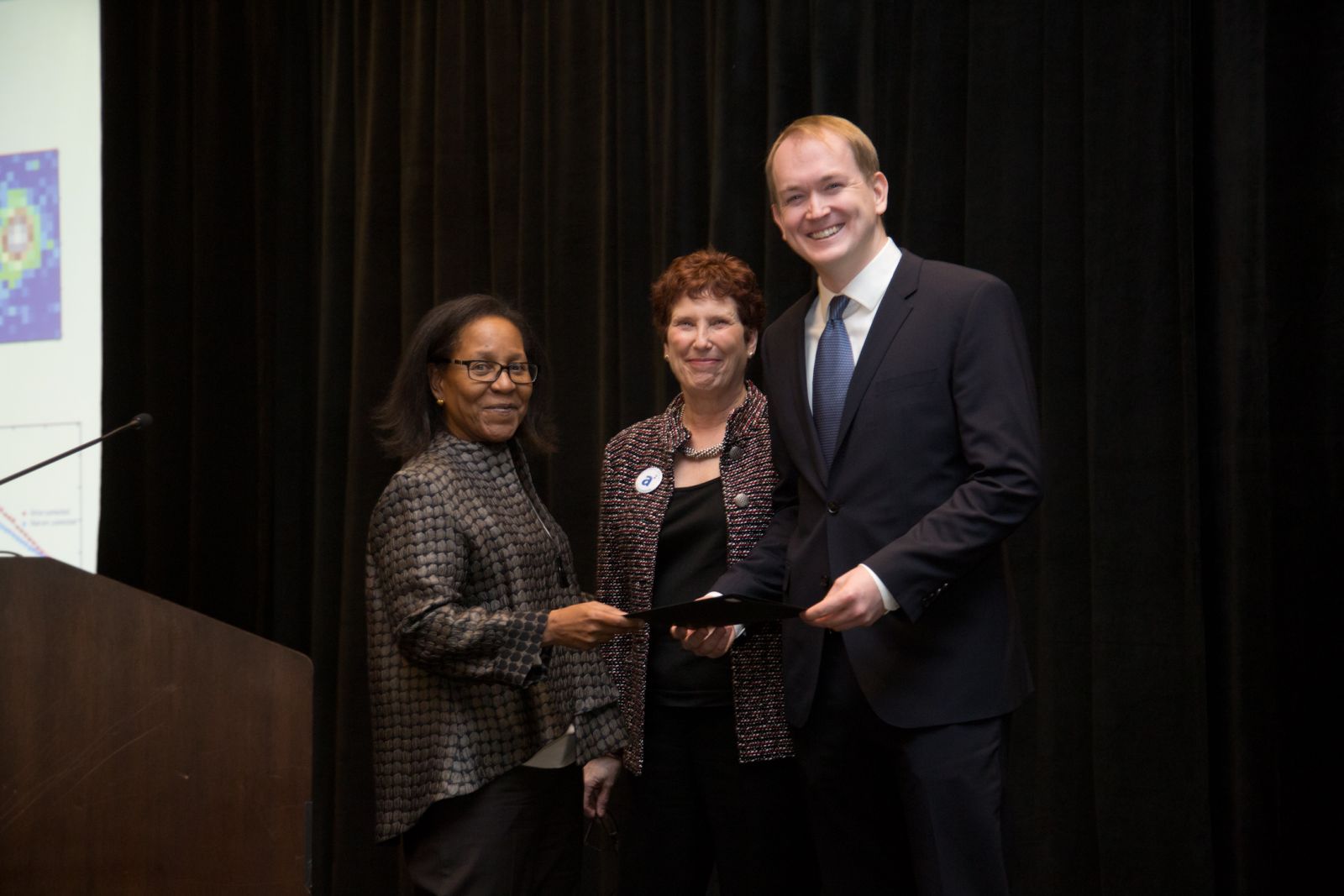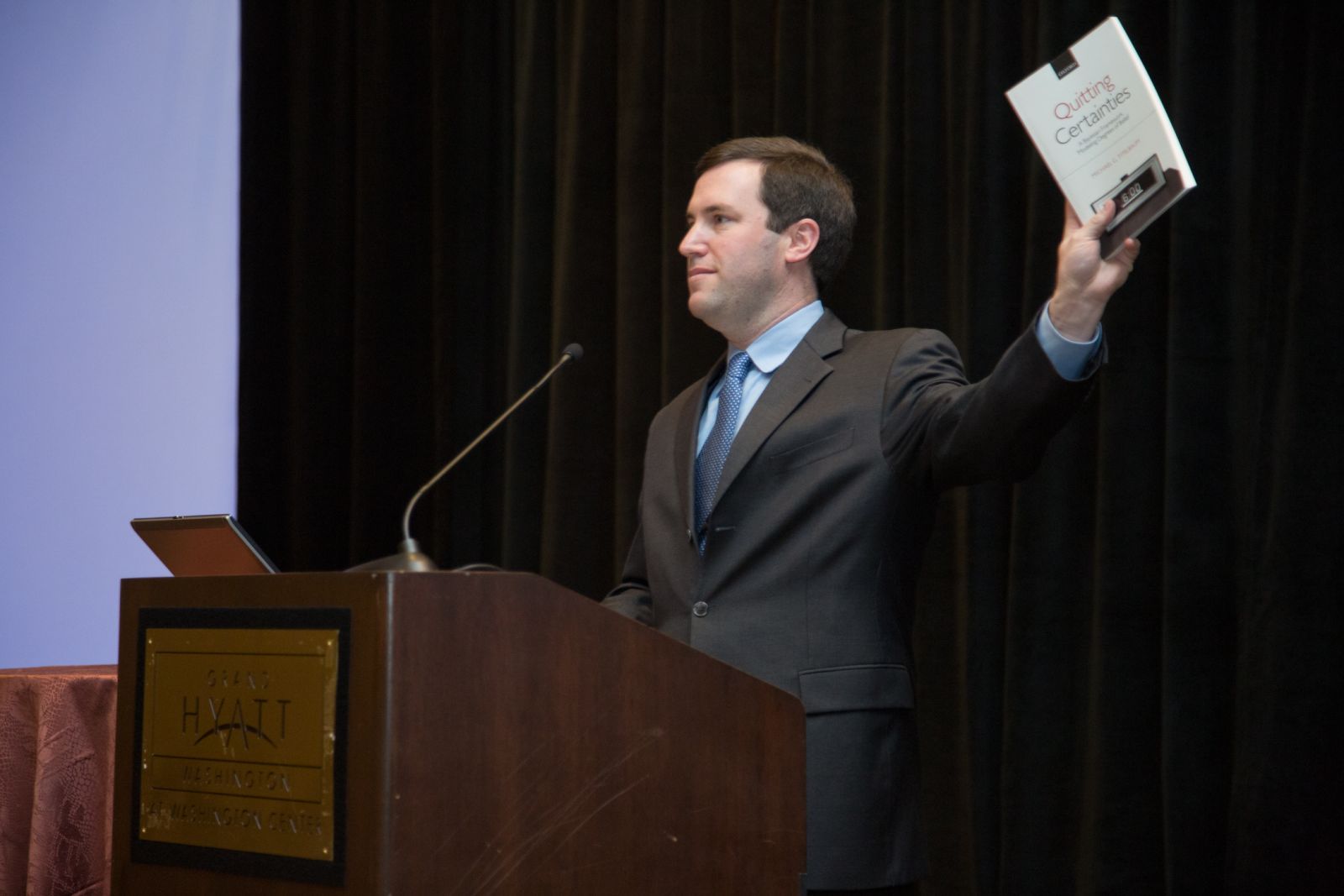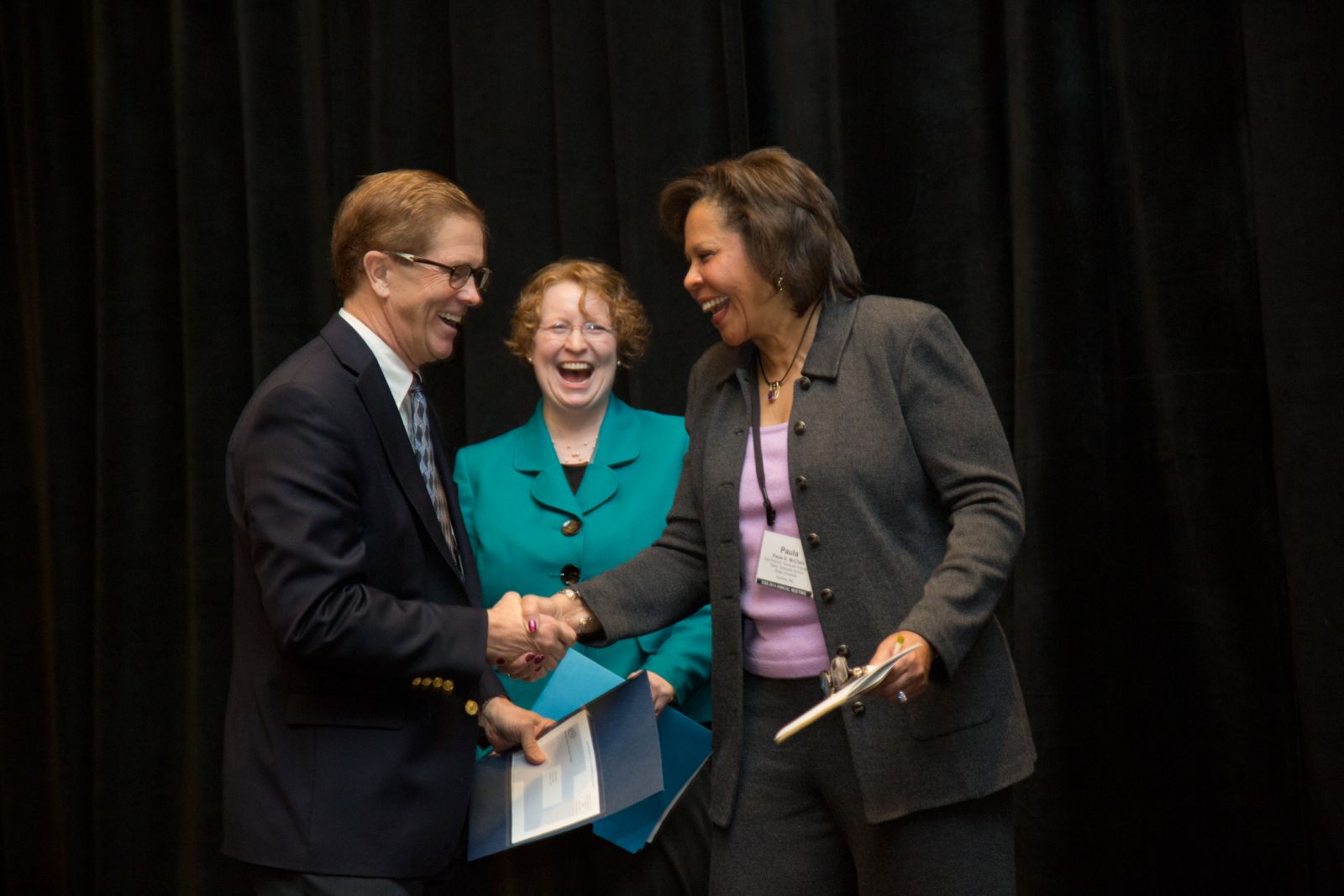You are on CGS' Legacy Site.
Thank you for visiting CGS! You are currently using CGS' legacy site, which is no longer supported. For up-to-date information, including publications purchasing and meeting information, please visit cgsnet.org.
Featured
Contacts:
Julia Kent, CGS: (202) 223-3791 / jkent@cgs.nche.edu
Barri Bronston, Tulane University: 504.314.7444 / bbronst@tulane.edu
New Orleans and Washington, DC — The Council of Graduate Schools (CGS) has announced that Brian S. Mitchell, Professor of Chemical and Biomolecular Engineering at Tulane University, has been named the Council of Graduate Schools/National Science Foundation Dean-in-Residence for 2015-16. Dr. Mitchell brings to the post significant experience leading graduate education at his home university, having served as Tulane’s Associate Provost for Graduate Studies and Research from 2006 to 2014. Mitchell will join CGS on February 1.
The Dean-in-Residence program was created by CGS and the National Science Foundation (NSF) to support communications between senior graduate education leaders and the NSF. In this role, Mitchell will share with CGS and NSF the insights, perspectives, and practical experience of a senior administrator at a research university, while collaborating with program officers and senior administrators across NSF to help plan future NSF programs and activities.
“Dr. Mitchell’s experience in graduate education is both broad and deep,” said CGS President Suzanne T. Ortega. “His particular experience establishing interdisciplinary graduate programs, collaborating on international research projects, and overseeing the training of graduate teaching assistants are just a few of the areas where he will be able to facilitate communication between CGS member institutions and NSF.”
In accepting the appointment, Mitchell stated that he looks forward to collaborating with NSF and CGS on important issues in graduate education.
"NSF has not only been a leader in supporting graduate student training, but in shaping the content of those students' professional development,” Mitchell said. “From innovative training programs to international research experiences, their leadership has been a critical component of enhancing graduate education. Similarly, CGS is the established leader in evaluating trends in graduate education and advocating on its behalf. My goal as Dean-in-Residence is to not only support those ongoing activities, but to explore innovative ways to document and demonstrate the positive societal and global impact that graduate education has, not only in the STEM and related fields, but in all scholarly and creative disciplines."
After receiving his PhD in chemical engineering from the University of Wisconsin-Madison (1991), Mitchell conducted research in numerous positions, including an NSF-NATO postdoctoral fellowship at the University Karlsruhe and Alexander von Humboldt Research Fellowships at the German Aerospace Agency and the Max Planck Institute for Colloids and Interfaces. His primary research areas of interest are nanostructured materials and materials processing.
In addition to his research experience, Mitchell has been a national and international speaker on issues in research and graduate education. His public service in STEM education has included frequent presentations to Louisiana elementary school children through the state’s “Speaking of Science” program.
About CGS
The Council of Graduate Schools (CGS) is an organization of over 500 institutions of higher education in the United States and Canada engaged in graduate education, research, and the preparation of candidates for advanced degrees. Among U.S. institutions, CGS members award 91% of the doctoral degrees and 81% of the master’s degrees.* The organization’s mission is to improve and advance graduate education, which it accomplishes through advocacy in the federal policy arena, research, and the development and dissemination of best practices.
* Based on data from the 2013 CGS/GRE Survey of Graduate Enrollment and Degrees.
About the Tulane University School of Science and Engineering
The Tulane University School of Science and Engineering combines the very best of a top tier research university with a strong commitment to high quality undergraduate education. The rich tradition of excellence, the interdisciplinary intellectual environment, the personal attention to students at all levels, and the setting in picturesque New Orleans make the Tulane School of Science and Engineering a truly exceptional experience.
The School of Science and Engineering offers degree programs at the undergraduate and graduate levels that span the biological sciences, the physical sciences, the behavioral sciences, mathematics, engineering, and computer science. Currently, the School enrolls 1737 full-time undergraduates, 127 master students, and 346 doctoral students. The regular faculty of the School consists of 119 tenure stream faculty, 32 professors of the practice, and 14 research professors. Of the tenure stream faculty, 13 hold Endowed Chair positions, 10 hold Endowed Professorship positions, and 6 hold Endowed Early Career Professor positions. The School is comprised of 14 facilities located on the Uptown New Orleans, Downtown New Orleans, and Riverside Campuses. School of Science and Engineering faculty members are affiliated with 9 Tulane University research centers. For more information about the Tulane School of Science and Engineering, please visit our website at http://tulane.edu/sse/.
At the CGS 54th Annual Meeting, December 3-6, 2014 in Washington, DC, attendees enjoyed engaging sessions, terrific speakers and exciting networking. We've recapped several plenary sessions below for an engaging look through audience tweets and photos. Explore #CGS54 conversations in Storify, and keep in touch with CGS on Twitter and Facebook!
As an influential leader in higher education and former White House cabinet official, University of California System President Janet Napolitano joined attendees to discuss the trends, challenges and opportunities in graduate education. She urged deans and graduate leaders to "make the case" for education and research, calling for greater interaction with the public and policy makers to ensure the graduate enterprise is meeting America's needs.
National Science Foundation (NSF) Director France Cordova shared updates and perspectives on the NSF role in supporting a diverse, high quality science and engineering workforce. Cordova pointed to reframing grad ed to meet the needs of society and of students, and introduced an online forum NSF is using to gather feedback from its stakeholders.
TIAA-CREF chief executive and Federal Reserve Bank alumnus Roger Ferguson shared a view of graduate education from the Fortune 100, emphasizing that partnerships between the academy, business, and government can make a positive difference for students, institutions and society.
Stan Collender, nationally-renowned expert on the federal budget process, shared insights on the current budgeting climate and offered predictions on spending decisions, economic conditions, and fiscal and monetary policies affecting graduate education during the 114th Congress and beyond.
Graduate scholars make incredible contributions of new knowledge every year. The CGS Annual Meeting showcases a few of the very best breakthroughs in the form of dissertations, publications, and new innovations by graduate schools and administrators to promote student success. Awardees for 2014 pushed forward epistemological inquiry, demonstrated the first ever quantum error correction in a solid-state device, found new ways to measure the resolve of powers in international conflicts, and empowered graduate students to set their own agendas for professional development.
CGS is delighted to celebrate each year a number of scholars whose work has made exceptional contributions to their fields. Duke University was also announced as the winner of the 2014 ETS/CGS Award.
2014 CGS/ProQuest Distinguished Dissertation Awards

Michael Titelbaum Wins 2014 Arlt Award in the Humanities

Duke University wins 2014 ETS/CGS Award for Innovation in Promoting Success in Graduate Education

Attendees at the CGS 54th Annual Meeting in Washington, DC, enjoyed engaging sessions, terrific speakers and exciting networking. Click on the images below to view this album at our Facebook page.
Shifts Emerge in Student Demographics, Fields of Study
Contact:
Julia Kent
jkent@cgs.nche.edu
(202) 223-3791
Washington, DC — The Council of Graduate Schools (CGS) today reported that first-time enrollment of international students at U.S. graduate institutions has grown for the fifth consecutive year. Between 2013 and 2014, first-time enrollment of international graduate students increased by 8%, while total graduate enrollment also increased by 8%. The findings are based on the 2014 CGS International Graduate Enrollment Survey, Phase III: Final Offers of Admission and Enrollment.
The new data indicate that U.S. graduate programs continue to be a destination of choice for many of the world’s prospective graduate students, despite increasing global competition to attract top talent. This trend is consistent with a growth in applications from prospective international students, which has grown each year over the past nine years.
CGS President Suzanne Ortega noted that the growth trends may also reflect the fact that U.S. graduate institutions have become more strategic about recruiting international students to their campuses. “Given the growing international competition for top students, U.S. institutions have been developing new ways of communicating with prospective students and offering students who matriculate stronger support services after they arrive. Universities understand that they can’t afford to lose the contributions of these talented students to research and innovation on their campuses.”
Despite the general upward trend of first-time enrollments of international graduate students, survey findings also indicate emerging shifts in students’ countries of origin and fields of study. For example, first-time enrollment of students from India increased 27%, marking the second year in a row of double-digit growth in first-time enrollments of students from that country. The increase in Indian enrollment offset a 1% dip in first-time enrollments of students from China in 2014, the first decline measured since the survey was initiated in 2004. This change in Chinese first-time enrollment concerns a relatively large number of students, since Chinese students constitute 33 percent of the total enrollment of international graduate students in the U.S.
The survey report also provides a glimpse of shifts in interest in various fields of study. Fields that have historically drawn a high proportion of graduate students, physical & earth sciences and engineering, showed the highest growth in first-time enrollment for 2014, at 20% and 11% respectively. On the other hand, arts and humanities programs, not traditionally associated with international graduate students, have shown modest but steady gains in first-time enrollment, increasing by 3% for 2014, and following gains of 9% for 2012-2013, 5% for 2011-2012, and 5% for 2010-2011. A 2% increase in first-time enrollment in business marks a slowing down of growth documented earlier in this field, which had seen an increase in first-time enrollment of 6% for 2012-2013, 15% for 2011-2012, and 9% for 2010-2011.
Trends by country/region of origin
Substantial variations in growth were found among the sending countries and regions analyzed in the study:
- First-time enrollment of students from India increased 27% in 2014, following a 40% increase in first-time enrollment in 2013.
- First-time enrollment of Chinese students decreased 1% in 2014.
- First-time enrollment of students from Brazil increased 91% in 2014, following a 17% increase in 2013 and a 14% increase in 2012. It should be noted that these increases concern a relatively small number of students.
- First-time graduate enrollment of students from South Korea and Taiwan declined 7% and 8% respectively in 2014.
- Changes in first-time graduate enrollment of students from the Middle East were the largest among the three regions followed (8%), a trend that has been consistent for the past three years.
Trends by broad field of study
First-time enrollment of international graduate students increased in all but one of the fields for which the survey collects data. Survey data showed a 1% decrease in first-time enrollment of international students in education, although it is important to note that the number of international students pursuing graduate studies in this field is relatively small compared with other fields. The largest gains in enrollment occurred in physical and earth sciences (20%) and engineering (11%), followed by life sciences (7%), arts and humanities (3%), ‘other’ fields (2%), business (2%), and social sciences and psychology (2%). Changes in first-time enrollment by field are shown in the table below.
| Field | Increases in International First-Time Enrollment, 2013 to 2014 |
| Arts & Humanities | 3% |
| Business | 2% |
| Education | -1% |
| Engineering | 11% |
| Life Sciences | 7% |
| Physical & Earth Sciences* | 20% |
| Social Sciences & Psychology | 2% |
| Other Fields | 2% |
*Includes Mathematics and Computer Sciences
International first-time graduate enrollment increased at both public institutions and private, not-for-profit institutions in 2014. At public institutions, international first-time graduate enrollment increased 9% in 2014 following an 11% gain in 2013, while at private not-for-profit institutions, international first-time graduate enrollment increased 6% in 2014 following an 8% increase in 2013.
About the report
Findings from the 2014 CGS International Graduate Admissions Survey, Phase III: Final Offers of Admission and Enrollment is based on the third phase of a three-part annual survey of international graduate student applications, admissions, and enrollment among U.S. member institutions. The survey had a response rate of 62%, including 80 of the 100 institutions that award the largest number of graduate degrees to international students. The report is posted at http://www.cgsnet.org/benchmarking/international-graduate-admissions-survey. Overall, the 308 institutions responding to the Phase III survey conferred 67% of the approximately 109,000 graduate degrees awarded to international students in the United States in 2011/12.
The Council of Graduate Schools (CGS) is an organization of over 500 institutions of higher education in the United States and Canada engaged in graduate education, research, and the preparation of candidates for advanced degrees. Among U.S. institutions, CGS members award 91% of the doctoral degrees and 81% of the master’s degrees.* The organization’s mission is to improve and advance graduate education, which it accomplishes through advocacy in the federal policy arena, research, and the development and dissemination of best practices.
* Based on data from the 2013 CGS/GRE Survey of Graduate Enrollment and Degrees
Join the Annual Meeting conversation on Twitter! Using our hashtag #CGS54, you can interact in real time with fellow attendees and other graduate education leaders. Make the most of the event by sharing your perspectives, thoughts, and reactions throughout Annual Meeting sessions.
For more social media updates, follow us on Twitter at @CGSGradEd and 'like' us on Facebook.
Do your prospective students or promising undergraduates have the information they need to consider the benefits of graduate education? Do they understand the options for financing a graduate degree? Make CGS flyers a standard part of your orientation packets and info sessions throughout the year! Three of our most popular flyers are newly revised for 2018.
Titles include: Financing Graduate Education, Open Doors with a Doctorate, and Why Get a Master's Degree?
Flyers are available for purchase online. Bulk rates available for CGS members. For complete details on CGS publications, visit cgsnet.org/publications.




